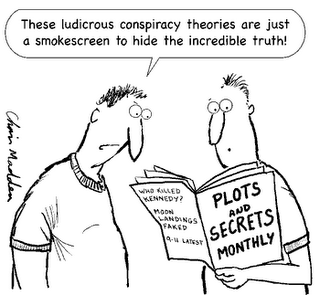The text of a talk given at Occupy Wellington, New Zealand, on October 27 2011. Around 55 people attended the talk, organised to try to counter the prevalence of conspiracy theories amongst the local wing of the Occupy movement.

Kia ora kotou, thanks everyone for coming. Firstly, a brief run-down of how this workshop will work: first, I’m going to give a brief talk, followed by an open discussion which anyone can contribute to. I also want to make it clear that I’m not here today to debunk or debate any specific conspiracy theory. I’ve got no interest in doing that, I don’t think its particularly productive. What I want to be doing is talking about the title of the workshop is – why our activism must be based in reality. So we’ll be talking about the whole conspiracy world-view, we’ll be talking about what I think is a much better alternative to that, but I’m not going to sit here and argue with you over whether the Government is secretly poisoning us from the skies, or whether shape-shifting reptilian lizards are controlling our lives, or whether or not you can cure cancer with baking soda.
First up, who am I? For those of you who don’t know me my name is Asher, I’m born and bred in Wellington, though I have also spent a few years recently living in Christchurch. I’ve been involved in activism and radical politics for around about 7 years, in a variety of different campaigns and struggles.
If we’re going to talk about conspiracy theories, the first important question is obvious: what is a conspiracy theory?
Now, if you go by a dictionary definition, a conspiracy is just a group of people who get together to plan something, and don’t tell others about it. If I’m organising a surprise birthday party for my friend, then I am conspiring with others. But that’s not a particularly useful definition for the purposes of a discussion like this.
So, for this discussion, the way I’m defining a conspiracy theory is thus: a conspiracy theory is a theory based in supposition, one that flies in the face of evidence or science, often one that claims its correctness can be shown by the paucity of evidence in favour of it, in the sense that ‘this conspiracy goes so far that they’ve even buried all the evidence that proves it!’ Conspiracy theories often encourages an ‘us few enlightened folk versus everyone else’ world view. This creates an atmosphere where conspiracy theorists look down on people, or sheeple as they are often called, and ignores the fact that people, by and large, are actually pretty intelligent. In and of itself this world-view is hugely problematic for as I will discuss later, mass social change requires the participation of the masses and therefore, we have to have faith in the ability of people to decide things for themselves, to come to correct conclusions and ultimately to change the world. Continue reading “Against conspiracy theories: Why our activism must be based in reality”

Just another WordPress site